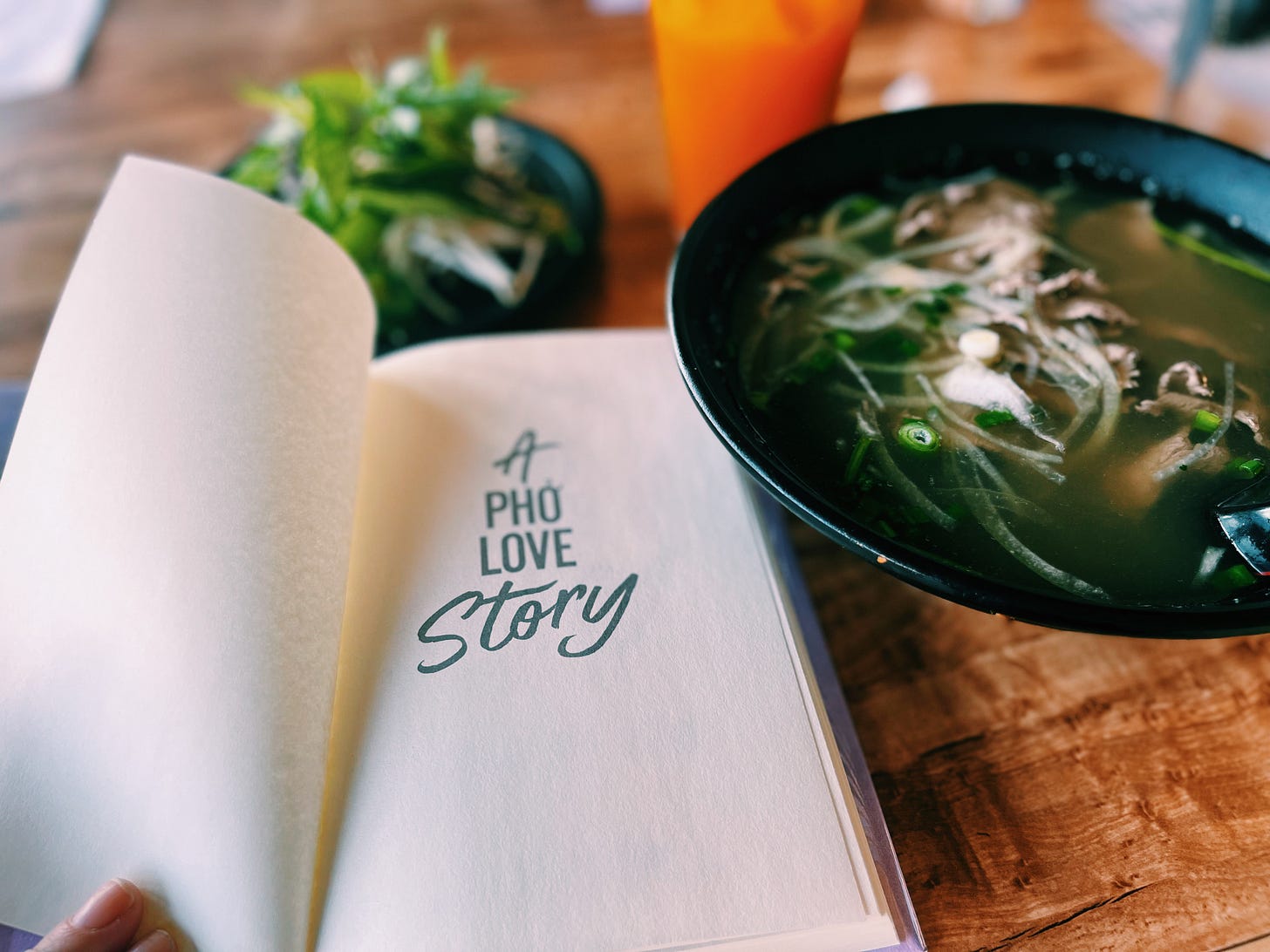A look at language, family history, and food in a YA novel
an interview with Loan Le, author of A Phở Love Story
In my last note I told you that in addition to personal updates I was going to be focusing this newsletter more on children’s and YA books, whether that’s in terms of reading or writing (since those are both passions of mine). Today I’m super excited to be sharing with you just that, in the form of a mini-interview with author Loan Le.
I recently read and loved Loan Le’s debut novel A Phở Love Story. Here’s the pitch from Loan’s website: When Dimple Met Rishi meets Ugly Delicious in this funny, smart romantic comedy, in which two Vietnamese-American teens fall in love and must navigate their newfound relationship amid their families’ age-old feud about their competing, neighboring restaurants.
You guys, I loved this book so much (as in 5 stars) that I immediately emailed Loan upon finishing it (I also passed it to my daughter to read next). In addition, I reached out to a grad school professor who I hadn’t connected with in 15 years because her story reminded me of my professor and of the time he took our small class out to a phở dinner (where he ordered all the food for us in Vietnamese) and told us a little bit about his refugee experience. That’s the power of books, folks: when they move us to some kind of strong emotion or action, we are reminded of what a powerful force they can be.
Since my background is in languages, I am always very in tune to how authors handle and include languages other than English in their books. I really love it when authors don’t translate everything word for word. Loan does this brilliantly so I asked her about her approach to language. Here’s her response:
“Including Vietnamese in the dialogue felt natural to me. I'm used to my mom speaking to me in Vietnamese and English, often switching mid-sentence. And I find myself answering my parents in English even if they're talking to me in Vietnamese. I wanted to capture that sort of fluid exchange because I feel that it happens in a lot of bilingual households. And personally, when I'm thinking of Vietnamese things, like the food I mentioned in the novel, I never use the translation, just the Vietnamese word for it.
I knew I didn't want to do direct translations because that almost felt like I was including unnecessary repetition . . .
I tried my best to give enough context so that readers would understand what's being said. But I don't think it's my place as an author to hand-hold or necessarily "teach" readers the language or the culture. The whole book is an invitation, and I'm happy if people accept that invite. If not, that's also fine too!”
One thing I love about this in a YA book, is that it trusts even the young reader to be able to figure out what ‘s going on, which I think shows a respect for the audience.
There is a fine line in children’s & YA literature of focusing on the young protagonists and then deciding how much to explore their families’ stories. So next I asked Loan what inspired her to write about the Vietnamese refugee experience and have her two main characters be the children of immigrants.
“In general, parents in young adult literature don't seem to have much of a life or a backstory. Sure, they can be supportive parents, sweet and all that. Or they're villainized for enforcing tough rules. Or they're just plain absent. But I can't easily recall YA where the parents' lives are given room to breathe. On one hand I understand: the story should be about the teenagers. But, I don't know, I can't remember my teenage years without remembering my parents, my family, and their influence. And I was familiar with their story. So that also felt natural to include.
I also rarely saw literature that focused on children of immigrants. And the ones I'm familiar with show the children struggling with where they belonged, whether they're American enough, etc. Which is definitely a struggle that is true for many--and there's still not enough novels about that! But I hoped to add another slice to this vast spectrum of YA by exploring the lives of kids who understood that they belonged, but were just unsure how to move forward while also maintaining their relationship with their old-school parents.”
I think part of what made A Phở Love Story feel like such a rich, well-rounded tale was because of the way Loan included the previous generation’s story in the plot line, and how we get to see its reveal through the young characters’ eyes.
Finally, I asked Loan about food. Because boy does this book make its reader hungry. :) I was so curious if she had any of her own restaurant experience and what her favorite Vietnamese dish was.
“I'm just a fan of food, and Vietnamese food is definitely comfort to me. No personal connection to the restaurant world. I might stalk too many chefs on social, though. :) I'm a sucker for cơm gà (here’s a recipe she shared).”
Thank you so much to Loan Le for her time. You can visit her website and learn even more about her book (and the upcoming one too!). If you’re a YA fan or a romcom lover, I can’t recommend this book enough! (Off to eat a bowl of phở… edited to update: I did and it was delicious.)

If you enjoyed this newsletter, please consider sharing it or subscribing if you haven’t yet. And of course, pop over and leave a comment if you have thoughts on language, family history, or food in YA literature.
xo,
Nicole






